Remedy for Non-Payment of Service Fees by Property Owners
Homeowners legally obliged to pay annual service fee to owners association in Dubai
THE NEW COMMON PROPERTIES LAW IN DUBAI
The Common Properties Law No. 6 (2019), which came into effect on November 19, requires all “fractional ownership” properties in Dubai to have owners associations and property management companies acting on their behalf. It prescribes the collected funds to go into the service accounts of approved banks.
WHAT IS AN OWNERS ASSOCIATION (OA)?
An owners association is a group of homeowners with a set of leaders elected to act on behalf of the whole community. It manages, operates and maintains the common areas of the property and enforces rules and regulations of the jointly-owned property. They are in charge of service fee collections, budgeting, payment for specific services and supplies and maintaining the reserve fund.
WHO APPROVES THE SERVICE FEE/CHARGE?
In Dubai, the owners association service charge must be approved by the Real Estate Regulatory Authority (RERA). Service charges for a property owner will apply to all of the registered areas specified in the title deed.
WHAT IS THE PROBLEM WITH SERVICE FEE/CHARGE?
Some owners do not understand the necessity of paying the charges on time. According to Saeed Al Fahim, CEO of Stratum Owner Association, which oversees a portfolio of more than 12,000 units in Dubai, the rate of non-payment from owner of property here is about 40 per cent. Other industry sources say they also face similar payment "holds" in their service charge collections.
WHAT IS THE RERA’S ROLE ON SERVICE CHARGES?
RERA is setting the JOP budget and the service charges. RERA is unlikely to be swayed by requests to raise service charges immediately if an OA or developer had been operating on a lower charge for two or three years, say industry officials.
FOR THE OWNERS, WHAT DOES THE LAW ENTAIL?
“From now on, homeowners get to see the breakup of each fil they have paid for the upkeep of their building’s common areas,” explained Marwan Bin Ghalita, CEO of RERA. In other words, developers can no longer dictate the setting up and running of these owners associations.
I'M A HOMEOWNER. WHAT IF I DON’T PAY ON TIME?
The new Common Properties Law No. 6 (2019) provides for a remedy… a strong one. “Within one month of non-payment, a legal notice can be issued to the owner,” explained Saeed Al Fahim, CEO of Stratum Owner Association. “Then they (OA) can go to the Rental Dispute Committee (under Dubai Land Department) and get the unit blocked… and if need be, put up for auction.”
WHAT HAPPENED BEFORE?
“Before the Law, an OA/developer could appoint XYZ company to do the audit and that was submitted to RERA and approved,” said Saeed Al Fahim, CEO of Stratum Owner Association, which oversees a portfolio of more than 10,000 units in Dubai. “Now, they can’t do that – RERA has appointed its own external auditors to go over the books and come up with their own decisions.
WHAT DOES THE LAW STIPULATE IN TERMS OF RESPONSIBILITY?
The Law placed RERA at the centre of oversight of jointly owned property. The new Law empowers homeowner associations to be responsible for the upkeep of their assets.
WHAT HAS CHANGED THIS TIME?
RERA has taken complete control over the audit of property maintenance costs and how service charges are set. Now, all financial audits of the previous must be submitted to RERA by January 30. By March 15, the budget reviews need to be done with. Earlier, there was no set timeline.



